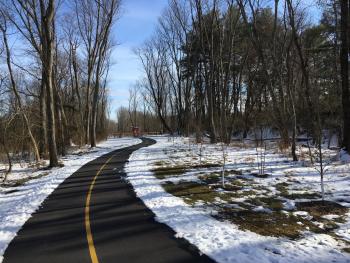Greenway Master Plan FAQ's
Frequently Asked Questions
-
Who will use greenways?
- Children on bikes, babies in strollers, skaters, people in wheelchairs, runners and adults walking
or riding bikes to work, for pleasure or to connect with nature.
-
What about litter on greenways?
- In addition to providing trash cans and signage, patrol volunteers would be encouraged to pick
up any litter.
-
How will emergencies be dealt with?
- Just as with any other emergency, in a true emergency, 911 should be called and dispatchers
will send the appropriate response team. With the addition of more greenways, the County and
municipalities may consider installing more "blue light" emergency call boxes along the
greenways.
-
Do greenways open up adjacent landowners to additional crime or vandalism?
- Crime does not typically occur in places where there are lots of people and few hiding places.
Greenways are crime deterrents as they lack escape routes (separates criminals from an escape
vehicle) and provides ‘visibility’ with so many eyes and ears (ie. cell phones and cameras) on the
trail. Multiple studies have shown that greenways are some of the safest places in America,
“you are much less likely to be a victim of crime than in one’s own home, in a parking lot or
walking down the street”. Additionally, adjacent property owners to greenways/trails
experience less vandalism and crime than other neighborhoods.
-
What is my liability if a trail user is injured on the trail or on my adjacent property?
- When a public trail intersects privately owned land, landowners are offered protection under
State recreational use statutes. Trail users wandering onto posted private property are
considered trespassers under the law. Adjacent landowners are not at risk as long as they
abstain from ‘willful and wanton misconduct’ against trespassers such as recklessly or
intentionally creating a hazard.
-
What is a greenway overlay district?
- A greenway overlay district would apply to areas of land along a greenway corridor as identified
in the Master Plan. The overlay district would be part of the Land Development Code and,
through a voluntary process, allow future greenway corridors to be procured. In the current
Land Development Code, new development is required include street trees and provide one linear
foot of sidewalk or walking trail for every linear foot of new road. In a greenway overlay district,
a developer could provide a greenway easement in lieu of these other requirements.
-
What is 'connectivity'?
- Greenway connectivity combines a comprehensive trail network with the local transportation
system connecting sidewalks, bike lanes and multi-use trails/pathways for a balanced, multimodal
transportation option. It creates a cohesive network for recreation and ‘active’, alternative
transportation linking people, destinations and community resources. As more trails are
connected to one other, the benefits of any particular greenway are greatly enhanced. “Build it
and they will come (walk, run and ride).”
- Greenway connectivity also links people to places and destinations where they live, work, learn,
shop and play. These include our existing (and future) parks, playing fields and courts,
playgrounds, dog parks, open fields, nature trails, picnic shelters and exercise stations as well as
schools, libraries, commercial districts, historic, cultural and natural sites. It accentuates our
quality of life providing a more livable community infused with entrepreneurial spirit and vitality.
-
What do the lines on the maps mean?
- The lines on the maps symbolize the relative location of the proposed greenways. The majority
of the lines follow rivers, streams, railroad tracks, and roadways. Some are drawn in straight
lines to signify the connection between point A and point B. The actual location of the
greenways has yet to be determined. The County's policy is to only build the greenways where
there are willing property owners and/or available public land.


